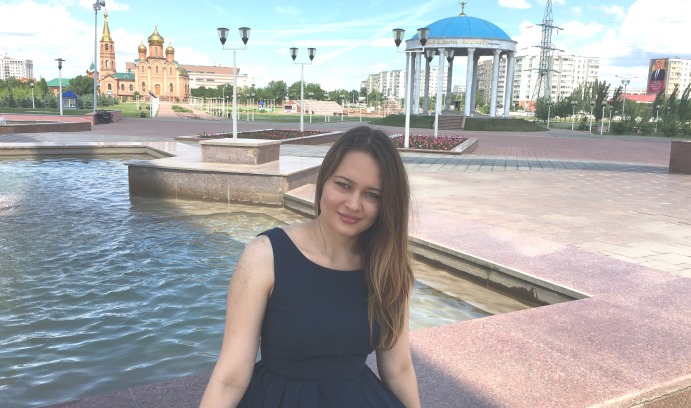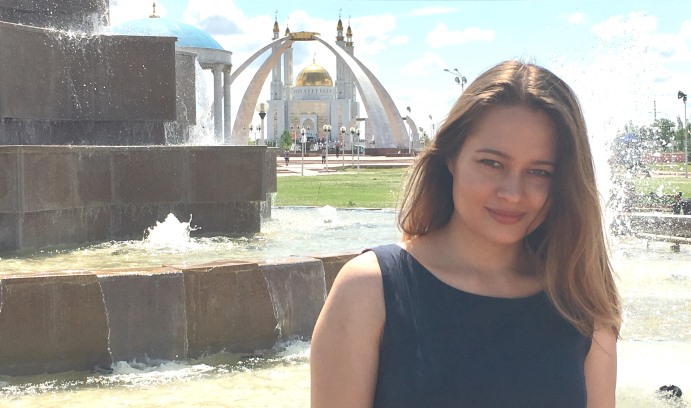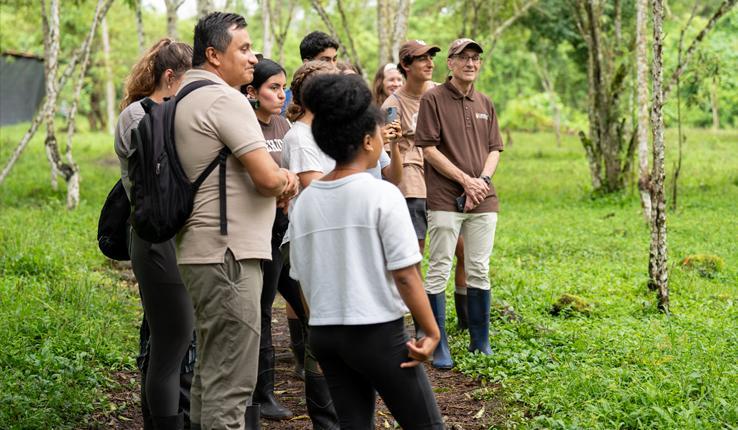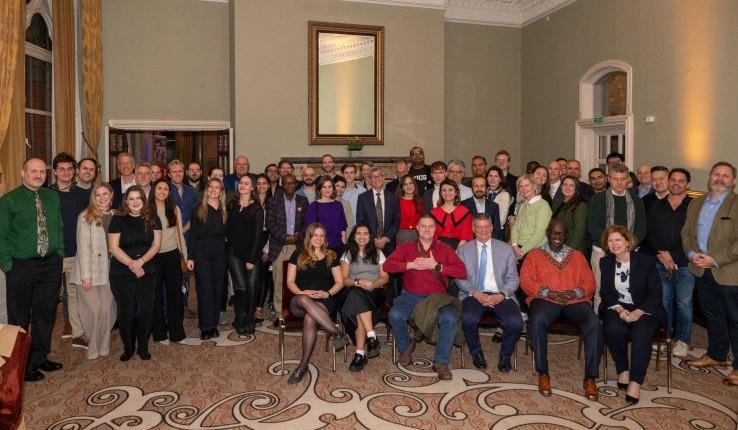The Dignity of an Honest Debate

Anastassiya Perevezentseva ’18, shown here in the Park of the First President of the Republic of Kazakhstan in Aktobe, received the 2017 Libraries Student Research for an essay she wrote on human dignity. In the background to the left stands St. Nicholas Orthodox Cathedral. (Photo courtesy of Anastassiya Perevezentseva)
Religion and politics, it is said, are two subjects that polite—and prudent—people should avoid talking about at social occasions.
Some observers go further, cautioning people to check their political and religious beliefs even when talking with friends and family members.
Anastassiya Perevezentseva ’18, a native of Kazakhstan, begs to differ. She believes the private gathering and the public square can be a forum for lively, open-ended and fruitful discussions. Friends need not fall out because they disagree about politics, she says. People with opposing viewpoints shouldn’t shy away from debates over abortion, gay marriage or euthanasia.
A healthy exchange of views, says Perevezentseva, requires mutual respect, honesty and a willingness to put oneself in another’s shoes. A conversation conducted on these premises, she believes, can be educational and can help people learn to explain and defend their own positions better.
Perevezentseva expanded on these ideas last fall in a paper she wrote for a seminar course called “What Is Human Dignity?,” which is offered to students in Lehigh’s Eckardt Scholars honors program. Her paper, which is titled “Is Dignity an Inescapably Religious Concept?,” examines the concept of human dignity from religious and non-religious perspectives, including Judaism, Christianity, Islam, Kantianism and secular humanism. The seminar course was taught by Dena Davis, the Presidential Endowed Chair in Health at Lehigh and a professor of bioethics in the department of religion studies.
The term human dignity, Perevezentseva notes in her paper, is used to shape public opinion and is invoked in debates over morality and ethics, often by people on opposing sides of an issue. To prevent the term’s meaning from being distorted to fit an agenda, she suggests, those who use the term should identify the tradition that inspires them.
“In my paper,” she says, “I tell people, ‘Please say where you’re coming from and let’s have a discussion. This is how I identify human dignity because I come from this philosophical or religious tradition.’ Let’s talk about those things instead of trying to shut down my view or another view. Let’s actually have a debate, let’s bring in all those traditions and celebrate diversity and richness.”
This spring, Perevezentseva’s paper received the annual Libraries Student Research Prize from Lehigh’s Library and Technology Services (LTS) group. She shared the award with Deanna Kocher ’17, an IDEAS (Integrated Degree in Engineering, Arts and Sciences) major who wrote “Children’s Concept of Animacy: The Humanoid Robot and the Robotic Human.”
“The Library Prize reviewers were impressed with [Perevezentseva’s] thoughtful prose and sophisticated, extensive and sustained analysis from conception to conclusion,” the LTS group wrote on its website.
“In analyzing the contributions of Judaism, Christianity and Islam to the concept of dignity,” said Davis, “Ms. Perevezentseva took on a big intellectual challenge. Her paper showed strong skills in research, writing and organization, as well as original thinking.”
Monotheism and imago Dei
Anastassiya Perevezentseva grew up in Aktobe, a city of nearly 400,000 people along the Ilek River in western Kazakhstan. She comes from an ethnic Russian family, and while her parents raised her in a secular environment, she herself is Roman Catholic, having converted in 2014.
Nearly three-quarters of Kazakhstan’s citizens are Muslims and about a quarter are Christians, mostly members of the Russian Orthodox Church. The country’s government, says Perevezentseva, has established national holidays for Muslim and Christian holy days, and it hosts the annual Congress of Leaders of World and Traditional Religions in the capital city of Astana.
“I was lucky to grow up in a country with a history of tolerance,” says Perevezentseva. “I have friends who are Muslim and Orthodox. My Muslim friends wish me Happy Easter and I congratulate them on Eid.” (Eid al-Fitr marks the end of the Islamic holy month of Ramadan.)
In her paper, Perevezentseva cites the two pillars of human dignity proposed by American philosopher David H. Calhoun: human exceptionalism and imago Dei, the belief that humans are created in the image and likeness of God. She acknowledges that in America’s pluralistic society, a religious definition of human dignity is “problematic,” and she asks if secular traditions of thought can “provide a viable alternative definition that could reduce ambiguity…and be applied universally in the public discourse.”
The first section of the paper discusses the traditional definitions of human dignity by the world’s three Abrahamic faiths. Judaism, Perevezentseva writes, bases dignity on the freedom granted by God to human beings. This freedom finds its highest purposes when humans honor and worship God, strive to imitate him and uphold the sanctity of human life. The first duty of each person is to see the image of God in the other.
“Though respecting human dignity is of lesser importance than honoring God and showing obedience to God,” Perevezentseva writes, “it is of great significance in Jewish law.”
Christianity, like Judaism, adheres to the concept of imago Dei and the sanctity of human life. The early Fathers of the Church, says Perevezentseva, also linked the special status of humans to their ability to reason. St. Thomas of Aquinas, for example, asserted that this ability allows humans, unlike other creatures, to know and love God.
Christianity differs from Judaism and Islam in asserting the divinity of Jesus Christ. The unique Christian belief in the Trinity encourages believers to relate to God and to other humans in a profound way, just as the three persons of the Trinity—Father, Son and Holy Spirit—relate to each other.
“A Christian definition [of human dignity] would include doctrines of imago Dei, imitatio Dei, sanctity of human life, and both rational and relational aspects of human character,” Perevezentseva writes. “Human dignity is intrinsic, transcendental, and imposes certain obligations for a Christian way of life.”
Islam also holds that dignity is intrinsic and permanent, Perevezentseva says. It cannot be merited by pious behavior or forfeited because of unethical actions. Islam adheres to the concept of imago Dei but with a distinction: the Quran states that humans are created in the “form” of God but it prohibits an “assimilation,” saying that “nothing is as [God’s] likeness.”
Islam teaches that humans’ “capacity to implement and decipher God’s will is connected to reason, and, therefore, to human dignity,” Perevezentseva writes. Muslims also believe humans are Godlike because, as one writer put it, the human soul is endowed with the breath of God.
From Kant to secular humanists
In the second section of her paper, Perevezentseva examines secular beliefs about human dignity. She sees Immanuel Kant’s concept of dignity as a “valuable alternative to religious definitions of the term.” In keeping with his categorical imperative—“So act that you use humanity, whether in your own person or in the person of any other, always at the same time as an end, never merely as a means”—Kant asserted that dignity is relational, inalienable and connected with man’s unique ability to reason and to make moral choices.
Two potential difficulties arise with Kantianism, Perevezentseva says. His paradigm can be stretched to “choice worship” by those “who see an individual’s right to choose as the primary principle of human dignity.” And his affirmation of man’s ability to act morally suggests a “transcendental transformation of the human animal nature.
“The Kantian theoretical paradigm does illuminate a way in which one can view human dignity on a non-religious basis,” she writes, “but might contain some theistic premise because of the belief in the elevation of humans over nature.”
Secular humanists, Perevezentseva notes, argue that humans can act morally and virtuously without a belief in God. Humanists also reject the transcendence implied by Kantianism.
“The pillar of a secular humanist understanding of the world is reason,” she writes. “Differences of opinion should be settled by appealing to evidence, moral choices are subject to revision due to limitations of human knowledge, ideals should be used as guidelines…and a belief in a soul or spiritual aspect is to be rejected.”
Humanists contend that human dignity is inherent and that its origins need not be explained, says Perevezentseva. But this runs into trouble when attempts are made to apply it to public discourse. A conflict arises, she writes, “between human life possessing inherent worth and the right to pursue individual happiness.” Furthermore, some humanist groups, including Marxists, would argue that an individual has worth “only as a member of society.
“The absence of an explanation of the origin of human dignity, and an outline of the limitations of human dignity in regards to other humanist values, poses complications…in making moral judgments,” Perevezentseva writes. “Despite that critique, the secular humanist definition of human dignity does provide an alternative that encompasses nontheistic views and attempts to explain human worth without a religious premise.”
Overcoming polarization
At Lehigh, Perevezentseva frequently joins interfaith conversations in the Center for Dialogue, Ethics and Spirituality. She is a member of the campus Newman Society and, through the Lehigh-U.N. Partnership, she is the United Nations youth representative for Augustinians International, a Catholic nongovernmental organization.
In campus and classroom discussions, Perevezentseva has learned the value of seeing an issue from another person’s point of view.
“If we come from different philosophical or belief systems,” she says, “let’s be honest about that. Let’s educate each other. It will be harder. It’s much easier to slogan something and say that you are right and the other person is wrong.
“But if we say, ‘This is not who I am but I will look at the world through the lens of another person and understand where they’re coming from,’ we can at least be more productive, more fruitful, more respectful and more tolerant.”
The seminar course taught by Davis featured lively discussions on a variety of topics.
“In one of our classes,” says Perevezentseva, “we had discussions about whether a plant or an animal has dignity. In the Catholic Church, it’s very clear that we respect animals but that human dignity is valued more. But that class made me think, ‘How would I articulate my belief to another person who doesn’t believe in my religion?’”
In another class, students discussed euthanasia with an invited speaker.
“The speaker felt it was important for a person to have the choice to end their life when it would become burdensome. I realized I could not even place myself in her shoes to think about it that way because I come from a society where people have a shorter life expectancy.”
If religion should not be invoked to settle a disagreement, Perevezentseva has come to believe, neither should it be ignored.
“In the secular public square, what do you do when you cannot bring in your religious definition of human dignity? When I was researching my paper, I understood that because religions have such a rich philosophical heritage, we cannot shut them out of the public discussion completely. That would be reducing the question of human dignity to a very narrow set of knowledge. That’s not how the world operates. The person who is not religious can still relate to a lot of this [religious] heritage.”
With a little effort and respect, Perevezentseva believes, people can hold civil discussions, even in a society that feels culturally and politically polarized.
“To me, it’s interesting how society can get divided over a controversial issue. What I wish instead is to see people reach out to each other and say, ‘I value your opinion, let’s talk.’
“I find this to be a beautiful thing—to have discussions with people whom I might disagree with 80 percent of the time. I want to hear what they have to say.
“That’s a normal part of human decency and human dignity.”
Story by Kurt Pfitzer
Posted on:





